ESCAPE
Sixes and slip-slops – celebrating the tradition of Karoo farm cricket
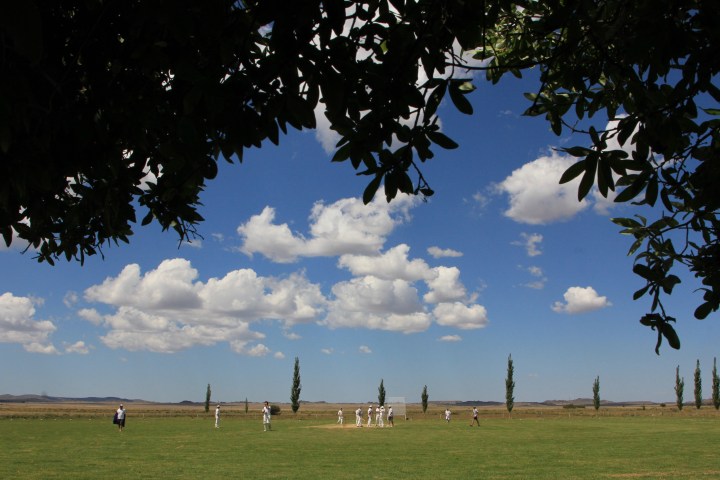
Blackie de Swardt, his wife Sheryl and their son Stephen are all hard-working souls. It does seem, however, that they just have far too much fun down on Prior Grange Farm outside Springfontein in the southern Free State.
Take young Stephen, for instance. He’s pretty sports-crazy and so resides in a cottage with a driving range for a front yard and a cricket pitch for a backyard. Sheryl runs her five superb guest cottages with a practised ease, hardly disturbing the meditating pond frogs as she passes with trays of delicious food en route to her guests. And Blackie, when he’s not farming, writes historical books and spends a bit of time up on Blockhouse Hill, where he watches the N1 traffic below and ponders on the Anglo-Boer War days of Springfontein.
Country cricket central
Prior Grange Farm becomes Cricket Central on the occasional happy weekend when almost everyone arrives thirsty, mostly in whites and ready to whack the willow and send the ragged red ball to all corners of the Karoo.
On a weekend in the late summer of 2012, we come to enjoy the fleshpots of Prior Grange, the company of the De Swardts and a good tussle between the Springfonteiners and the blokes from Colesberg, down the pike in the Northern Cape. Only two days before, the cricket oval was officially a pasture to 500 merino sheep. Stephen, the groundsman, tells us the pitch would favour the spinners on the day. We ask about the cricketing attire – would everyone be in white flannels? Most of them would, they assure us.
“It’s really only the boys from Bethulie who like to wear PT broeks and rugby socks on a cricket field,” says Blackie.
And what about elbow guards and helmets?
“Helmets are only worn by those who cannot bat,” he replies.

A massive hoick from an enterprising Springfontein batter. (Photo: Chris Marais)
Cupcakes and friendly faces
The following day we arrive at The Oval just before noon and find a clubhouse full of salami rolls, chocolate cupcakes and friendly faces. Huge picnic baskets are placed under shady trees and children have free access to all things sugary. It all looks a little “country Brit”, with the flowering pink and white iceberg roses and a small purple tide of wild garlic blooms. And then your eye catches sight of the Trans-Gariep Challenge trophy in the corner: a wildebeest skull pinned to a wooden shield.
Blackie’s field has been in operation since 1990, and has seen some cracking matches in its time. The Springfonteiners are also a travelling team, having played against places like Tweespruit, Aliwal North and Philippolis with a reasonable degree of honour. Their worst defeat, I am proud to announce, was against the Standard Cricket Club of Cradock, presently this writer’s home town.

A six-ball is signalled and everyone looks for the general direction in which the ball flew. (Photo: Chris Marais)
The players look a bit more resplendent than the umpires, one has to say. The umpires wear long blue dust jackets, takkies and slip-slops, later dispensing with the formalities of slip-slops and digging their bare toes ecstatically into the ‘hallowed turf’.
Flying six-balls
They start them young, out here in the Karoo. A boy of seven takes the field as a replacement for an adult no-show and acquits himself well. Blackie comes in to bat, scores a couple of runs and is then (in his own words) mightily distracted by a farmyard fly buzzing about his helmet. As a result, he is clean-bowled. Then the six-balls start flying around the place, mainly into the rough. Play is often suspended as the search parties are sent out to retrieve the R400 Hat Trick ball (a Kookaburra costs about R1 500 these days, I am horrified to discover) from one of the many meerkat burrows.

Now it’s time to search for the cricket ball in the meerkat burrows at one end of the field. (Photo: Chris Marais)
It’s a glorious day for cricket of any shape, form or standard. Puffy white clouds in the blue sky, a cheerful breeze taking the edge off the 34-degree heat, cold beers in the bag and trucks passing back and forth out there on the distant N1 like moveable advertising hoardings.
Eventually, it is clear that Springfontein is running away with the game, prompting one of the Colesbergers to say:
“Why don’t you guys declare, so we can get this braai on the go?”
The old mill
Down south in the Eastern Cape Karoo region, it’s Christmas time. But there’s one final matter to wrap up just before everyone heads down to the bright lights and vast beaches of Port Alfred, Kenton and Bushman’s River on the Sunshine Coast. Who will own the right, this season, to hoist The Midland Bat, a large, lovely and very old cricketing trophy that has been fought over with great passion on the field of play since 1891?
Will it be the venerable Standard Club of Cradock or the Bedford XI?
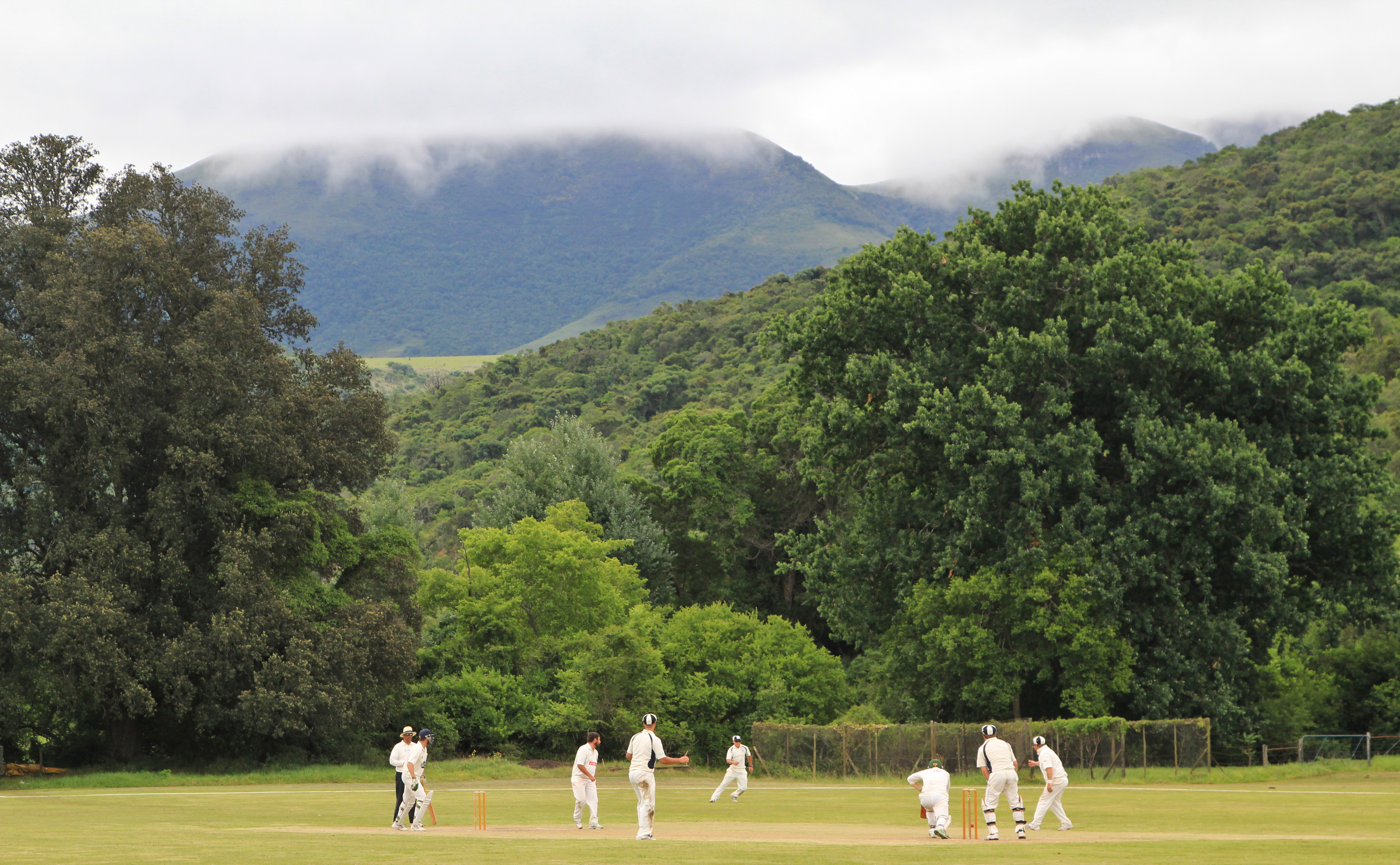
The lush general setting of The Mill cricket ground outside Bedford, Eastern Cape. (Photo: Chris Marais)
As a Cradock-based cricket fan, I drive over to Bedford one year to catch the spirit of this famous match which is to be played at Spring Grove, an amazing farm tucked into the folds of the Winterberg Mountains on the Adelaide road.
I can tell you with confidence: very little compares to the Mill Cricket Ground (MCG) out at Spring Grove Farm.
The old mill now serves as a pop-up pub and dining area. It was built in 1840 and milled grain for the surrounding community for more than 140 years. In 1983 the miller, one Totoi Mdliva, was crushed in the mill machinery and killed. The mill was closed down, the millstones were removed and a water feature was built as a memorial to the unfortunate miller.
The cricket field is right next to it. All about is a thick cluster of ancient oak trees, providing excellent shade for spectators. Across from the field are the densely-foliated foothills of thicket, sweet-thorn and kudu, loads of kudu, lurking within. It’s a mild day, great to be outdoors. Swallows swoop low over the outfield. Cows moo in the background and there are sheep in a neighbouring field, their noses deep into the grazing.
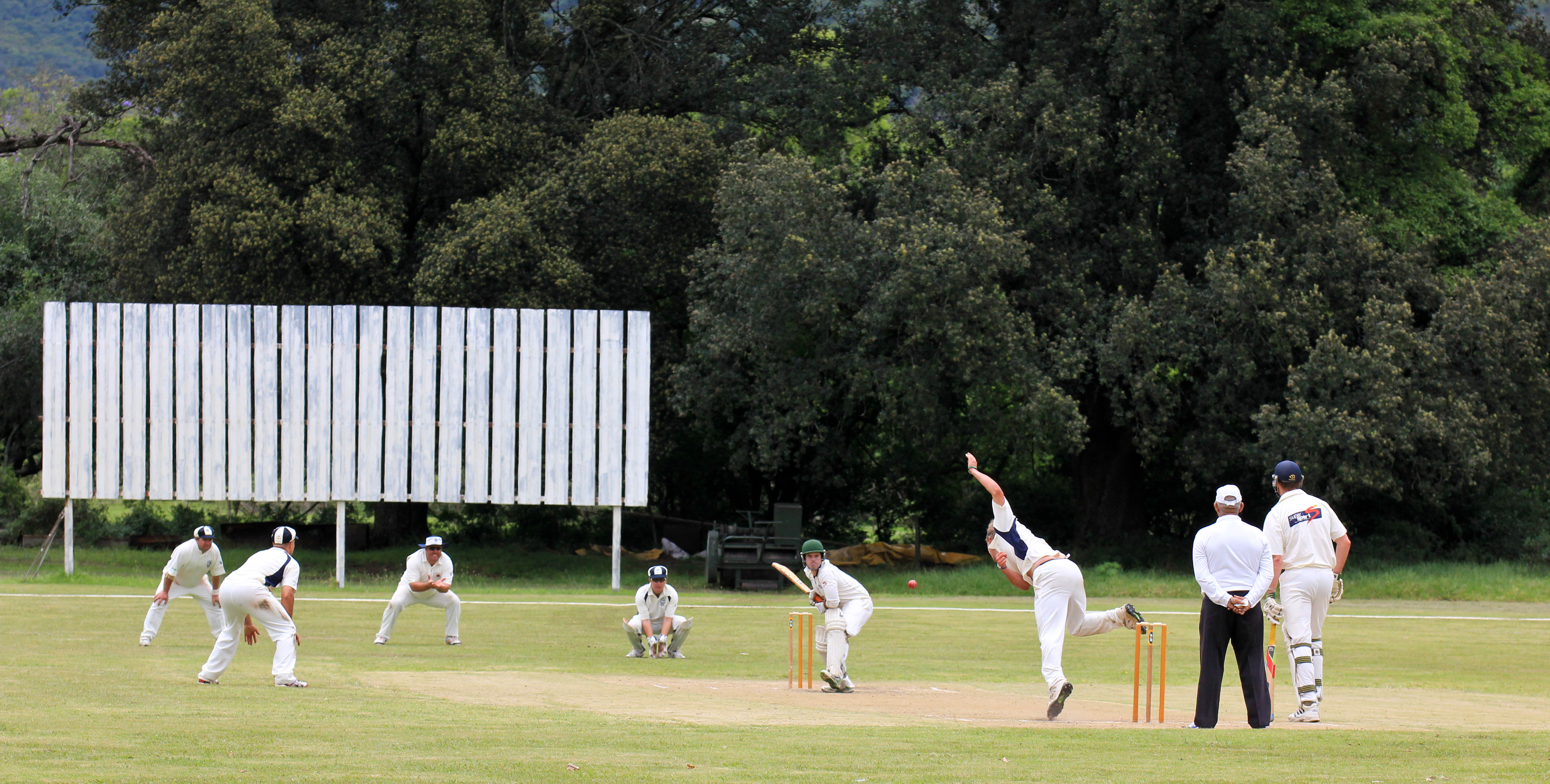
Everyone dresses in more formal cricket attire in this 1820 Settler heartland. (Photo: Chris Marais)
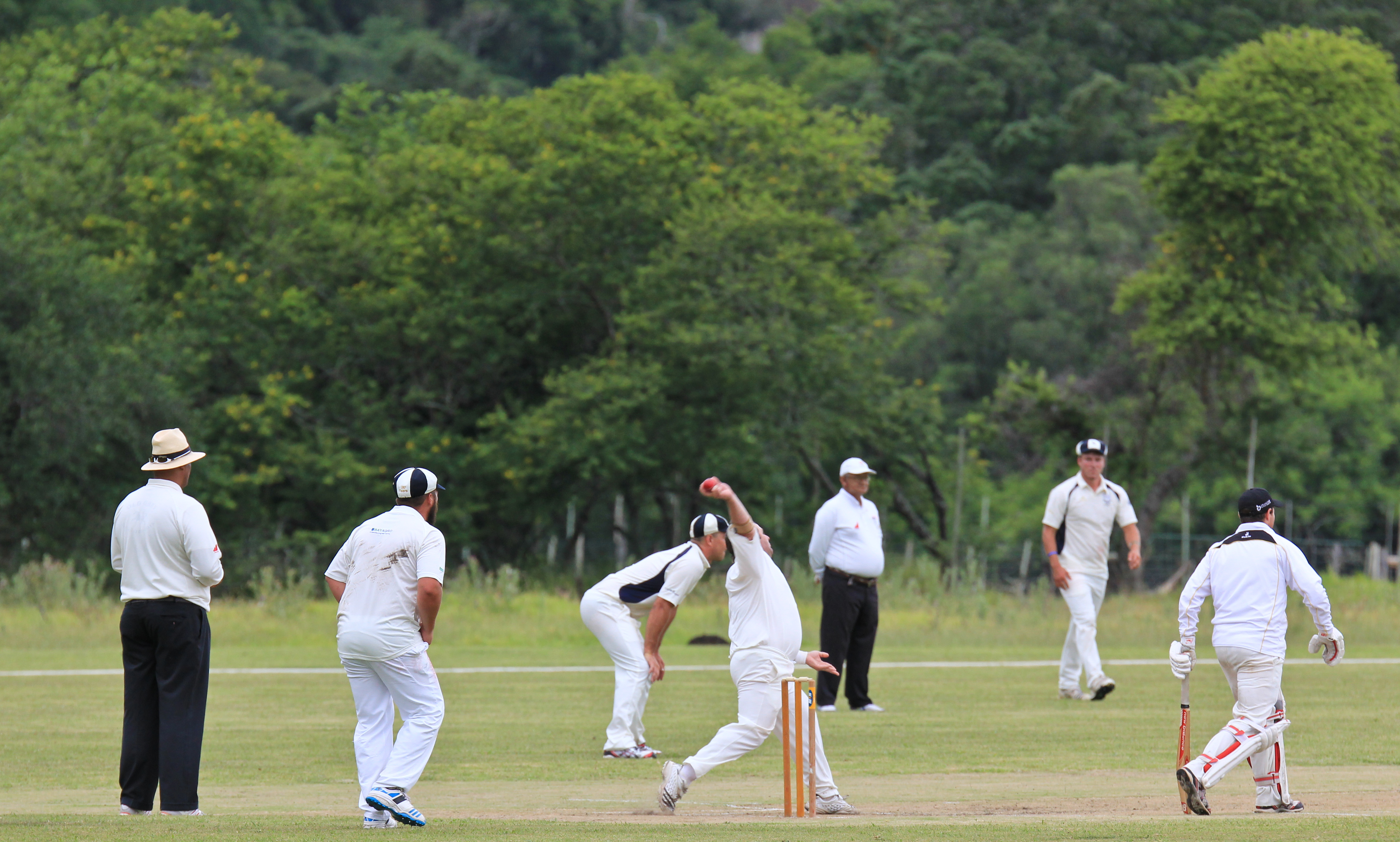
The action on the field hots up – both teams are keen to win the annual Midland Bat. (Photo: Chris Marais)
Farm owner Lochart Ainslie and I stand talking in the cool green shade of the massive oaks that grew from acorns brought over by the first Ainslie ancestors back in 1834.
“The children played with them on the ship on the way over from Scotland,” says Lochart. I compliment him and the groundsman on the condition of the pitch which, especially for a farm cricket field, is near perfection.
“We’ve played at some rougher venues in the district,” says Lochart. “I remember one match near Grahamstown (now Makhanda) where I had to evict a puff adder from Fine Leg and kick out a thorn tree sapling from Third Man.”
He says the field has been top-dressed with crushed anthills and tons of manure – easily obtainable from local sources.
Bangladesh played here
The MCG at Spring Grove is a lot younger than the oaks that surround it. The pitch was only set up in 1998. Apart from The Midland Bat event, held in the first week of December every year, the highlight for the MCG was when the chaps from Bangladesh came to play a hand-picked provincial team.
We watch Bedford at bat. The spirit between the two teams is, as ever, tense but friendly. Down here in the Eastern Cape Midlands, it pays to be civil. You never know when you might be buying a young bull or a stud ram from the bloke you just creamed with a bouncer.
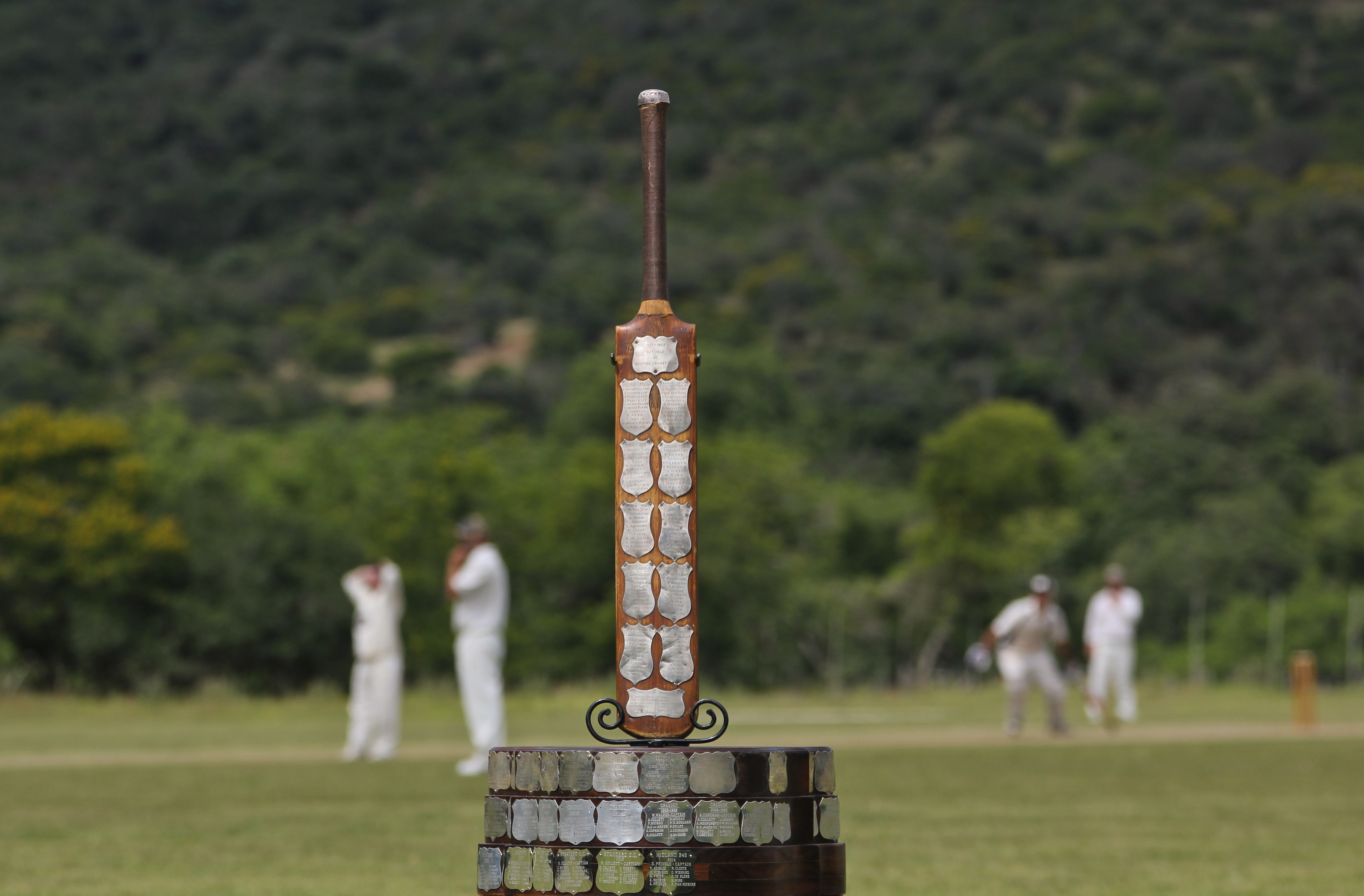
The coveted Midland Bat – South Africa’s oldest continuous cricketing trophy. (Photo: Chris Marais)
Those playing here remember seeing their fathers competing against one another, who in turn watched their fathers. The Bedford fellows usually come with Settler surnames like Pringle, Trollip, Hartley and Pitman. Cradock is a bit more of a mixed bag, with families like Copeman, Collett, Van Heerden and Du Toit in the team.
I wander off in search of the trophy and someone directs me to where it stands, proud on the bar counter. The only time The Midland Bat was not contested (and over the decades other district teams were also involved) was during the Anglo-Boer (South African) War, when matters between Boer and Brit were a little tense around here.
After the lunch break, the openers from Standard go out to bat, having been set a target of 150 runs. And although the crowd from the Great Fish River thinks it will be easy-peasy (Standard has some stellar strikers), Lochart’s son Hugh puts paid to those ambitions with some early wickets and The Midland Bat remains, for that year, in the deep and shady recesses of The Mill Pub, over the hills and under the oaks. DM
This is an extract from Karoo Roads II – More Tales from the Heartland, by Chris Marais and Julienne du Toit.
For an insider’s view on life in the Dry Country, get the three-book special of Karoo Roads I, Karoo Roads II and Karoo Roads III (illustrated in black in white) for only R800, including courier costs in South Africa. For more details, contact Julie at [email protected]




















Superb article!